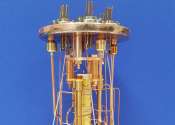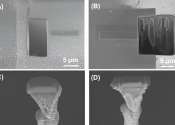Planetary Sciences
Study suggests Io's volcanoes have been active for 4.5 billion years
A team of geologists and planetary scientists from the California Institute of Technology, the University of California Santa Cruz, New York University, and NASA Goddard Space Flight Center reports evidence that Io's volcanic ...
13 hours ago
0
83
Nanophysics
European XFEL elicits secrets from an important nanogel
An international team at the world's largest X-ray laser European XFEL at Schenefeld near Hamburg has scrutinized the properties of an important nanogel that is often used in medicine to release drugs in a targeted and controlled ...
7 hours ago
0
13

Chemists introduce new copper-catalyzed C-H activation strategy
Inspired by what human liver enzymes can do, Scripps Research chemists have developed a new set of copper-catalyzed organic synthesis reactions for building and modifying pharmaceuticals ...
Inspired by what human liver enzymes can do, Scripps Research chemists have developed a new set of copper-catalyzed organic synthesis reactions for building ...
Analytical Chemistry
7 hours ago
0
17

Scientists discover new way to extract cosmological information from galaxy surveys
Scientists at the National Astronomical Observatories of the Chinese Academy of Sciences (NAOC) and their international collaborators have recently developed a new method for efficiently ...
Scientists at the National Astronomical Observatories of the Chinese Academy of Sciences (NAOC) and their international collaborators have recently developed ...
Astronomy
7 hours ago
1
146

Compact quantum light processing: New findings lead to advances in optical quantum computing
An international collaboration of researchers, led by Philip Walther at University of Vienna, have achieved a significant breakthrough in quantum technology, with the successful demonstration ...
An international collaboration of researchers, led by Philip Walther at University of Vienna, have achieved a significant breakthrough in quantum technology, ...
Optics & Photonics
7 hours ago
0
87

Merging nuclear physics experiments and astronomical observations to advance equation-of-state research
For most stars, neutron stars and black holes are their final resting places. When a supergiant star runs out of fuel, it expands and then rapidly collapses on itself. This act creates a neutron star—an object denser than ...
Astronomy
8 hours ago
0
71

Some plant-based steaks and cold cuts are lacking in protein, researchers find
Many plant-based meats have seemingly done the impossible by recreating animal products ranging from beef to seafood. But beyond just the taste and texture, how do these products compare to the real thing in nutritional value? ...
Biochemistry
8 hours ago
0
33

Which countries are more at risk in the global supply chain?
Using firm-level data from the global supply network, researchers from the Complexity Science Hub (CSH) quantified countries' exposure to production losses caused by firm defaults in other countries. According to their findings, ...
Economics & Business
8 hours ago
0
8
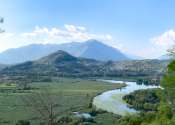
The Italian central Apennines are a source of CO₂, study finds
Tectonically active mountains play an important role in the natural CO2 regulation of the atmosphere. Competing processes take place here: At Earth's surface, erosion drives weathering processes that absorb or release CO2, ...
Earth Sciences
8 hours ago
0
136
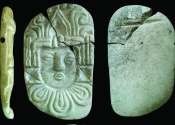
Dramatic burning of royal remains reveals Maya regime change
New archaeological investigations in Guatemala reveal that ancient Maya peoples did not just passively watch their dynastic systems collapse at the end of the Classic period. They actively reworked their political systems ...
Archaeology
8 hours ago
0
36
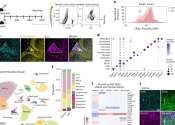
How myeloid cell replacement could help treat autoimmune encephalomyelitis
Autoimmune conditions such as multiple sclerosis (MS) are disorders of the immune system associated in this case with demyelination of the central nervous system (CNS). The term demyelination describes damage to the layer ...
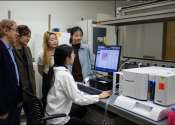
Researchers develop a new way to safely boost immune cells to fight cancer
Last year alone, more than 600,000 people in the United States died from cancer, according to the American Cancer Society. The relentless pursuit of understanding this complex disease has shaped medical progress in developing ...
Oncology & Cancer
7 hours ago
0
33
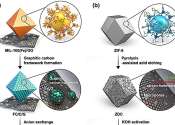
Researchers develop sodium battery capable of rapid charging in just a few seconds
Sodium (Na), which is over 500 times more abundant than lithium (Li), has recently garnered significant attention for its potential in sodium-ion battery technologies. However, existing sodium-ion batteries face fundamental ...
Energy & Green Tech
8 hours ago
0
62

The Future is Interdisciplinary
Find out how ACS can accelerate your research to keep up with the discoveries that are pushing us into science’s next frontier
 Medical Xpress
Medical Xpress

How myeloid cell replacement could help treat autoimmune encephalomyelitis

New research defines specific genomic changes associated with the transmissibility of the mpox virus

Analyzing the progression in retinal thickness could predict cognitive progression in Parkinson's patients

Geneticists develop world's first bioinformatic tool to identify amyloids consisting of multiple copies of same protein

Using AI to trace the origins of metastatic cancer cells

Dozens of COVID virus mutations arose in man with longest known case, research finds

Signs of multiple sclerosis show up in blood years before symptoms, study finds

Deeper dive into the gut microbiome shows changes linked to body weight

A new therapeutic target for traumatic brain injury

Solving the puzzle: Autism diagnosis often takes longer for girls, whose symptoms can differ from boys'

Over 100 scientists rename airborne viruses after COVID-19 mistakes
 Tech Xplore
Tech Xplore

A flexible and efficient DC power converter for sustainable-energy microgrids

Versatile fibers offer improved energy storage capacity for wearable devices

To build a better AI helper, start by modeling the irrational behavior of humans

The biggest barrier to a vibrant second-hand electric vehicle market? Price

Crime detection and crime hot spot prediction using a deep learning model

Quarter of UK 5 to 7-year-olds have smartphone: Study

Proof-of-concept nanogenerator turns CO₂ into sustainable power

New research defines specific genomic changes associated with the transmissibility of the mpox virus
Mount Sinai scientists, in collaboration with researchers from the Carlos III Health Institute (ISCIII) in Madrid, Spain, have located and identified alterations in the mpox virus genome that potentially correlate with changes ...
Diseases, Conditions, Syndromes
8 hours ago
0
18
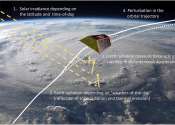
Weather prediction models can also forecast satellite displacements
New research finds that modern weather models can accurately predict satellite movements due to the energy emitted and reflected by the Earth. In addition to weather prediction, weather models can also help understand and ...
Earth Sciences
8 hours ago
0
81
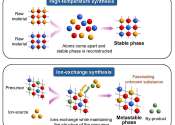
Accelerating the discovery of new materials via the ion-exchange method
Tohoku University researchers have unveiled a new means of predicting how to synthesize new materials via the ion-exchange. Based on computer simulations, the method significantly reduces the time and energy required to explore ...
Analytical Chemistry
8 hours ago
0
23

Researchers set new standards for nanoparticles, helping patients with MS, ALS, Parkinson's disease
Is it possible for nanoparticles to go through the digestive system and deliver medicine directly to the brain tissue? Researchers from Michigan State University say yes, and their latest findings are expected to benefit ...
Bio & Medicine
9 hours ago
0
44
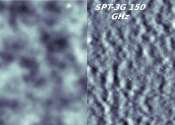
Technical trials for easing the (cosmological) tension
Thanks to the dizzying growth of cosmic observations and measurement tools and some new advancements (primarily the "discovery" of what we call dark matter and dark energy) all against the backdrop of General Relativity, ...
Astronomy
12 hours ago
4
57

Researchers explore causal machine learning, a new advancement for AI in health care
Artificial intelligence is making progress in the medical arena. When it comes to imaging techniques and the calculation of health risks, there is a plethora of AI methods in development and testing phases. Wherever it is ...
Health informatics
9 hours ago
0
4

Global study finds there really are more insects out after dark
Have you ever wondered if there are more insects out at night than during the day?
Plants & Animals
9 hours ago
0
3

Analyzing the progression in retinal thickness could predict cognitive progression in Parkinson's patients
Although there are still some aspects pending confirmation for its use in the clinical setting, and its resolution needs to be improved slightly, a study by the UPV/EHU and Biobizkaia has shown that a method routinely used ...
Parkinson's & Movement disorders
9 hours ago
0
18

Why zebrafish can regenerate damaged heart tissue, while other fish species cannot
A heart attack will leave a permanent scar on a human heart, yet other animals, including some fish and amphibians, can clear cardiac scar tissue and regrow damaged muscle as adults.
Plants & Animals
10 hours ago
0
14

Scientists trigger mini-earthquakes in the lab
Earthquakes and landslides are famously difficult to predict and prepare for. By studying a miniature version of the ground in the lab, scientists at the UvA Institute of Physics have demonstrated how these events can be ...
Earth Sciences
10 hours ago
0
56

Fusion-energy quest makes big advance with EU-Japan reactor
The inauguration of the world's most powerful fusion machine brings the dream of clean, safe and abundant power closer.

Pomegranate power: Unlocking sustainable antimicrobial solutions from peels
Pomegranates, known for their rich phenolic content, have been explored for their potential as natural antimicrobials. The research focuses on the peel, which contains a high concentration of these beneficial compounds and ...

How climate change affects potato cultivation in South Korea
A study published in the journal Potato Research presents results on the response of spring and summer potatoes to climate change in South Korea. The study, conducted by scientists from the Leibniz Center for Agricultural ...

Mars rover continues progress along upper Gediz Vallis ridge
Curiosity continues to make progress along the margin of upper Gediz Vallis ridge, investigating the broken bedrock in our workspace and acquiring images of the ridge deposit as the rover drives south.

Self-adjusted reaction pathway enables efficient oxidation of aromatic C-H bonds over Co@Y catalyst
The selective oxidation of aromatic C-H bonds has drawn significant attention in both industrial and fine chemistry due to its crucial role in converting readily- and cheaply-available aromatic hydrocarbons into high-value-added ...

US says two 'forever chemicals' are hazardous, tells polluters to pay
The US Environmental Protection Agency on Friday classified two so-called "forever chemicals" as hazardous substances, meaning those responsible for releasing them will have to pay to clean up contamination.

Actions needed beyond lawsuit to address social media's influence on youth, say experts
While four Ontario school boards recently announced a $4.5-billion lawsuit against the social media giants behind Facebook, Instagram, Snapchat and TikTok, Brock University experts are calling for additional actions to address ...

Study highlights importance of caregiver well-being in Uganda
A group-based curriculum called Journey of Life (JoL)—delivered over 12 sessions in the Kiryandongo refugee settlement in Uganda—led to improvements in mental health, social support, parental warmth and attitudes around ...

AI for Earth: How NASA's artificial intelligence and open science efforts combat climate change
As extreme weather events increase around the world due to climate change, the need for further research into our warming planet has increased as well. For NASA, climate research involves not only conducting studies of these ...

Two NASA sounding rockets launch from Alaska during solar flare
Two Black Brant IX sounding rockets launched from Poker Flat Research Range in Fairbanks, Alaska, April 17, 2024, during an M-class solar flare for NASA's sounding rocket solar flare campaign.

New report indicates alternative shelters lead to better outcomes for people experiencing homelessness
A new report from Portland State University's Homelessness Research & Action Collaborative (HRAC) indicates that alternative shelters provide better outcomes for people experiencing homelessness than traditional shelters.

New study examines the increased adoption of they/them pronouns
People are using "they/them" pronouns more often according to a new study by the University of North Carolina at Chapel Hill.

New research shines light on how expert mapmakers see the world differently
Researchers at Aston University have found differences between experienced Ordnance Survey (OS) mapmakers and novices in the way that they interpret aerial images for mapmaking, which could lead to improved training processes ...

Planned 'mass execution' of geese in Conn. city paused after outpouring of passionate input on both sides
Tears, shouts and interruptions marked residents' comments Wednesday night over a proposal to exterminate geese in Bristol, Conn., parks.

Reintroduced wolves kill four yearling cattle in latest of string of livestock attacks in Colorado
Wolves killed several yearling cattle in north-central Colorado this week, bringing the total number of wolf kills of livestock this month to six.

Researchers reveal sources of black carbon in southeastern Qinghai-Tibet plateau
Black carbon (BC) is the result of incomplete combustion of fossil fuels and biomass, with strong light absorption. It is second only to carbon dioxide as a climate-forcing factor for atmospheric warming. Deposition of BC ...

Scientists develop novel aggregation-induced emission carbon dots for bioimaging
Carbon dots (CDs) are an intriguing class of nanomaterials that have attracted a great deal of attention in recent years. These carbon-based materials possess excellent fluorescence properties, making them highly appealing ...

Scotland is ditching its flagship 2030 climate goal—why legally binding targets really matter
The Scottish government has rescinded its 2030 target of a 75% emissions cut to greenhouse gas emissions, relative to 1990. The target was statutory, meaning it had been set in law in the Emissions Reduction Targets Act of ...

Friend breakups: Why they can sometimes feel as bad as falling out of love
If you've ever gone through a friendship breakup you aren't alone—one study from the US found 86% of teenagers had experienced one.

Wild turkey numbers are falling in some parts of the US—the main reason may be habitat loss
Birdsong is a welcome sign of spring, but robins and cardinals aren't the only birds showing off for breeding season. In many parts of North America, you're likely to encounter male wild turkeys, puffed up like beach balls ...
















































